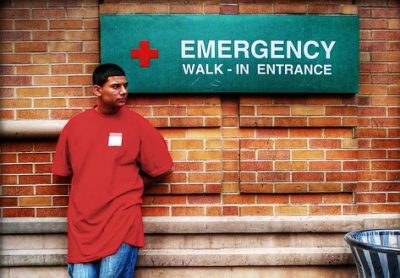Immigration 101
The U.S. immigration system is complex and can be difficult to understand. These resources provide key data points, historical information, and background on hot topics in immigration. Learn the basics about immigration. Immigration in the United States is complex and ever-evolving. Start here to understand the fundamental aspects of immigration policy, its history, and its impact on both individuals and the country at large. Learn commonly used terms about immigration law and how the U.S. immigration system is designed. Explore layered topics like how and whether immigrants can become citizens, as well as what individual protections look like under the law.
How the United States Immigration System Works
- How the Immigration System Works
- June 24, 2024
U.S. immigration law is very complex, and there is much confusion as to how it works. This fact sheet provides basic information…
Read More
Birthright Citizenship in the United States
- Birthright Citizenship
- October 16, 2024
This fact sheet explains birthright citizenship, the Fourteenth Amendment, and its interpretations. Who is…
Read More
Asylum in the United States
- Asylum
- August 27, 2014
Asylum seekers must navigate a difficult and complex process that can involve multiple government…
Read More
New Report Trumpets Irrelevant Opinion Poll to Bash Immigration Reform
Any serious researcher would probably tell you that trying to use a single public-opinion poll to gauge the likely impact of a policy initiative as complex as immigration reform is about as reliable as consulting a psychic. Yet that is precisely what some opponents of comprehensive immigration reform are now attempting to do. For instance, the Center for Immigration Studies (CIS) is trumpeting the results of a poll conducted in Mexico to suggest that creating a pathway to legal status for unauthorized immigrants currently living in the United States would trigger a tsunami of illegal immigration from south of the border. CIS completely ignores the fact that the last legalization program in 1986 did not spur an increase in unauthorized immigration (it actually reduced it in the short run). Instead, CIS acts as if popular beliefs and attitudes about immigration among Mexican citizens are a means of predicting the future. But popular perceptions are no substitute for hard data—and the data is not on CIS’s side. Read More

Old Dogs, Old Tricks: Nativist Groups Declare War on Clergy
Nativist groups are pulling an old strategy out of their play book as they attack members of the clergy. This tired exercise includes identifying a constituency that is in support of solving our nation’s immigration problems (currently the religious community), coordinating with other like-minded groups to disseminate faulty arguments (this time using the bible to condemn immigrants), claiming to be acting in the name of someone other than your self (in this case the American worker), and finally going after them with all the fervor you can muster to convince them that the bible preaches against helping strangers, that leaving the status quo in place is good for American workers and see how many spiritual leaders you can peel off. Read More

Nobel Prize Winners and Immigration Policy
Digital cameras, cancer and aging research, and technology networks that carry voice, video and high-speed internet data around the world are just a few reasons to thank this year’s Nobel Prize winners. We can also thank smart immigration policy that brought three of this year’s winners to our shores in addition to a young student from Kenya whose son is this year’s winner of the Nobel Peace Prize. Who are these foreign-born innovators? Read More

Report Details Dangers of Denying Health Care Coverage to Legal Immigrants
Last week, the Senate Finance Committee completed its mark up of its health care reform bill. Amendments that would have further restricted legal immigrants’ access to health care and imposed burdensome new verification requirements on everyone failed in the committee. Now both the Senate and the House have their work cut out for them as they combine various bills into one and bring them to the floor for final votes. It’s likely that we will see additional attempts to save money by cutting health care to legal immigrants. It’s also likely that more political statements about denying benefits to illegal immigrants will arise. This week the Migration Policy Institute released a new report, Immigrants and Health Care Reform: What’s Really at Stake? This groundbreaking report provides cold hard facts about the numbers of immigrants that would be affected by the various proposals in Congress. When analyzing the dangers of denying health care coverage to legal immigrants, MPI’s report examined Census data and discovered that: Read More

Restrictionist Group Uses Bible to Condemn Immigrants
For many years now, religious leaders and diverse faith groups have contributed much to the ongoing immigration debate. Grounded in faith and good works, the faith community has been and continues to be steadfast in their outreach to immigrants through a myriad of support and service programs, faith rallies and support of those in need. That being said, there are restrictionist groups who would rather sully the debate by co-opting faith-based terminology and tease anti-immigrant agendas out of Scripture. Yesterday, the Center for Immigration Studies (CIS) held such a panel discussion on the immigration debate from a faith-based perspective. CIS Fellow, James R. Edwards Jr., an apparent biblical scholar, was on hand to discuss his recently released report, A Biblical Perspective on Immigration Policy—the latest in a series of CIS publications on faith which writes off “compassion” as the practice of “religious elites” and attempts to speak for the majority of “rank-and-file” Christian laity who apparently “oppose legalization and support enforcement of immigration laws.” Edwards’ report attempts to examine the biblical role of civil government. Read More

Health Care Experts Agree: Including Immigrants in Health Care Reform Saves Taxpayers Money
Yesterday, the Sun Sentinel reported on what health experts have been saying throughout the factious health care debate: excluding immigrants from health care reform could jeopardize public health and leave costly gaps in insurance coverage. Health experts agree that preventative care, rather than costly emergency room visits—which cost, on average, about $1000 per visit—not only prevents the spread of infectious disease but also saves American taxpayers money in the long run. “If I’m standing next to someone who has tuberculosis and who is uninsured, it doesn’t protect me if they aren’t treated,” said Fernando Trevino, dean of the School of Public Health at Florida International University. “To the degree that someone is not getting care, they are more likely to spread infectious diseases to the rest of the population.” Read More

Does ICE’s Criminal Alien Program (CAP) Target Serious Criminals?
Over the past several years, ICE has increased the number of partnerships with state and local police. There has also been a new emphasis on identifying “criminal aliens” who are detained in jails and prisons, and deporting them once they finish their sentences. However, many concerns have been raised about how these programs are being implemented. In fact, various reports have shown that while ICE claims they are targeting serious criminals, the majority of persons ICE identifies and deports do not actually have any serious criminal records. Read More

Spanish Language Media Holds President Obama To His Promises
When President Obama hit the talk show circuit last weekend, he also included a visit to Al Punto, Univision’s weekend news program with anchor Jorge Ramos. Ramos questioned the President about undocumented immigrants, health care reform and his promise to reform the U.S. immigration system within the first year of his presidency. A tiny soundbite from that interview circulated the media last week which focused on the timing of comprehensive immigration reform, but the real lesson from this interview is that people are watching the subtle shifts in language and wording the administration has been using to discuss immigration and whether those shifts represent a change in commitment. Mr. Ramos politely but firmly pressed the President to answer to his promises—“la promesa de Obama”—to the U.S. immigrant and Latino population. The answers show a president who remains committed to immigration reform but who is also facing a series of practical challenges that have consequences for his full political agenda. Read More

New Report: Good Immigration Policy Creates a Stronger American Middle Class
The myth that immigration is bad for U.S. workers has sullied the immigration debate for far too long. A new report by the Drum Major Institute for Public Policy (DMI), “Principles for an Immigration Policy to Strengthen and Expand the American Middle Class: 2009 Edition,” sets the record straight. In the midst of the worst economic downturn since the Great Depression, and in anticipation of a new round of legislative debates on comprehensive immigration reform, DMI’s report makes a rational, concise argument for why comprehensive immigration reform is needed to improve the conditions for middle class Americans. Read More

Immigration Reform: Congress’s Perennial Pothole
At a gathering in Washington this week, long-time immigration reform advocate Congressman Luis Gutierrez announced that he would soon introduce a comprehensive immigration reform bill in the House. This marker bill is likely to have something for everyone in it, combining the DREAM Act, family reunification, a legalization program, and even smart-enforcement components. He gave the self-imposed deadline of October 13 for the framework to be ready and it couldn’t come sooner. The lack of immigration reform continues to plague the administration at every turn, and plays a role in every major legislative battle the administration has fought since the inauguration. It came up in the stimulus bill and is now making a command appearance in the health care reform debate. Read More
Make a contribution
Make a direct impact on the lives of immigrants.

